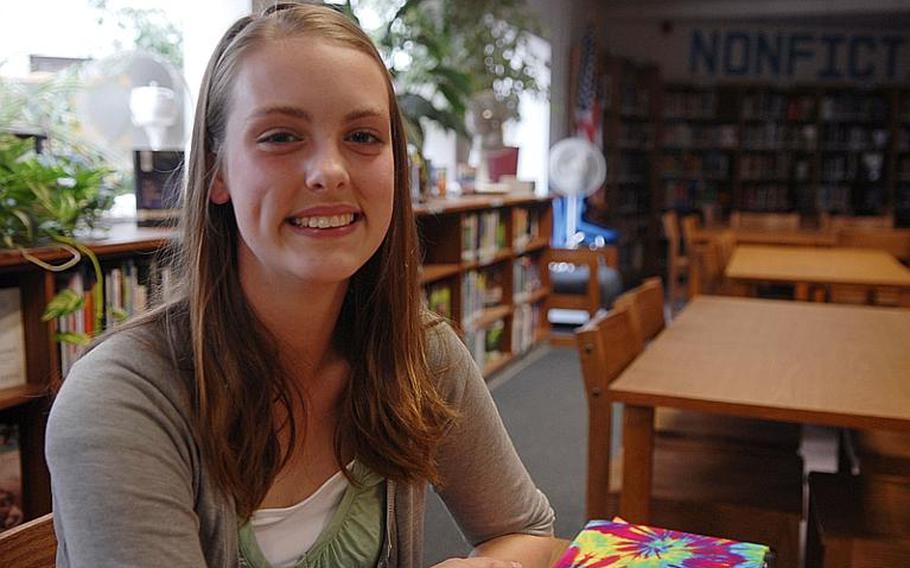
Sydnie Reynolds (Jennifer H. Svan / Stars and Stripes)
War is inescapable for Ramstein High School senior Sydnie Reynolds.
Her home at Ramstein Air Base, Germany, normally the busiest military hub in Europe and the first stop for wounded U.S. troops coming from Iraq and Afghanistan, serves as a constant reminder.
“You can almost reach out and touch it,” Reynolds, 18, said.
For the high-school graduating classes of 2010, the United States has been at war since they were in the fifth grade. For Reynolds and many of the 3,100 other seniors at military-run high schools around the world, that reality has been less a history lesson and more a part of growing up.
Carpooling with friends and parents can include trips to the base post office to mail care packages and soccer balls to Iraq and Afghanistan. A friend who is unusually quiet between classes might be waiting for an overdue phone call from mom or dad.
And when word spreads on base that someone’s been killed, teens with deployed parents hurry to verify it’s not one of their own.
Said Kyle Kaus, 18, a senior at Vicenza High School at the U.S. Army base Caserma Ederle in Italy whose stepfather has deployed to war zones four times: “I think we definitely take it more seriously. It doesn’t necessarily cross their (stateside students,) minds every day.”
Such life experiences — such as working with wounded troops at Landstuhl Regional Medical Center, in Germany — are reasons this year’s seniors “have emotional maturity way beyond their years: They are having to learn resiliency,” Ramstein High School guidance counselor Patty Carden said.
It’s a needed lesson. Many are about to leave a community immersed in wartime sacrifices and move on to college dorms or a stateside home where Iraq and Afghanistan are political arguments rather than duty assignments.
For the past four years, the Department of Defense Education Activity has graduated on average about 2,800 students. About two-thirds each year go to four-year colleges or universities, and another 13 percent to 19 percent go to two-year community colleges, according to a 2009 DODEA report on seniors’ plans.
That means many will be leaving behind friends and teachers with a heightened awareness of what it means to go downrange.
Bianca Le’s father, Chief Warrant Officer 4 Minh T. Le, is with the 173rd Airborne Brigade Combat Team in Afghanistan. She exchanges e-mails with him almost every day and gets to talk to him on the phone a few times a week.
“For me, this has been the most difficult deployment because it’s my senior year, and I know I won’t be able to see him much next year when I go off to college,” said Bianca Le, a 17-year-old senior at Vicenza.
Minh Le’s absence has added another challenge as his daughter applied for colleges. Her mother, Jasmin, is from Guyana and didn’t go to college in the States. With dad not there to help, Bianca Le relied on teachers and counselors to help with the applications and choices. She settled on Texas Tech to study biochemistry.
Not every military parent goes to war. Navy medical workers, explosive ordnance experts and others have played crucial roles in Afghanistan and Iraq, but many seagoing sailors haven’t served in the ground wars. However, a senior like Paolo Santos, 17, from Nile C. Kinnick High School at Yokosuka Naval Base in Japan, can appreciate Le’s anxious senior year. His father is at sea aboard the guided-missile cruiser USS John McCain.
“My mom’s been the one raising me,” Santos said. “My dad’s not going to be here for prom or graduation, because that’s just life in the Navy.”
Ryan Smith, a senior at Kubasaki High School on Camp Foster, Okinawa, worries that her new college friends won’t understand her military experiences, especially when the topic of war comes up.
“It will be the first time that I will not be surrounded by the military,” said Smith, 18, whose dad is a Marine Corps staff sergeant. “They might look and treat me differently, maybe in a negative way. I think they will treat me differently, like an outsider.”
Ramstein senior Reynolds said she treads lightly when it comes to war talk among nonmilitary peers.
Her father, Col. David Reynolds, a civil engineer with U.S. Air Forces in Europe, deployed to Iraq for a year during her freshman and sophomore years.
Reynolds believes not a penny should be spared in ensuring military personnel have the best, safest equipment and gear. Her friends outside the military don’t always see it the same way.
“We know people who are downrange right now,” her mother, Suzy Reynolds, said. “It’s much more personal.”
With graduation, it could be getting even more personal, Carden, the counselor at Ramstein, said.
In the past four years, 6 percent to 10 percent of graduating seniors from DODEA enlisted in the military. Last year, 35 seniors went to military academies. Another 188 went to school on ROTC scholarships.
These will be graduates who not only have seen a parent go off to war but now might have a best friend going to war, Carden said.
“It hits extremely close to their hearts,” she said.
Stars and Stripes reporters Kent Harris, Matthew Orr, Erik Slavin, Jennifer Svan and Teri Weaver contributed to this report.